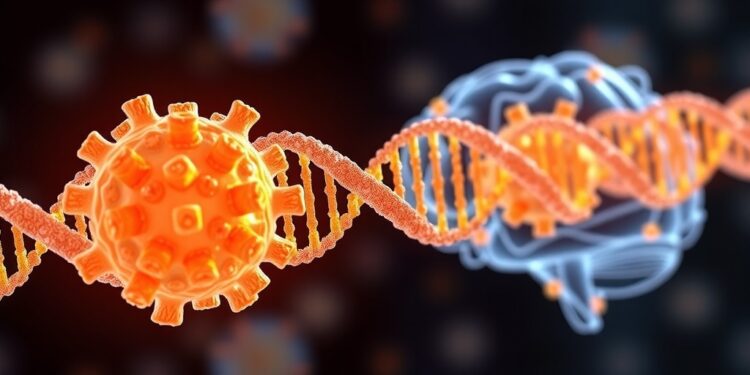Scientists at the Icahn School of Medicine at Mount Sinai have recently developed a groundbreaking lipid nanoparticle system capable of successfully delivering messenger RNA (mRNA) directly to the brain through intravenous injection. This recent advancement addresses a challenge that has long thwarted biomedical researchers and pharmaceutical developers—the formidable blood-brain barrier (BBB). This protective barrier, which serves as a shield for the central nervous system, often obstructs beneficial therapies from penetrating the brain, thus complicating treatment strategies for a plethora of neurological and psychiatric disorders.
The remarkable findings of this study, published in the esteemed journal Nature Materials, unveil the innovative use of blood-brain barrier-crossing lipid nanoparticles (BLNPs). These specially engineered nanoparticles not only overcome the inherent obstacles posed by the BBB but also carry substantial implications for the future of mRNA-based therapies, marking a transformational shift in therapeutic delivery systems. The meticulous research conducted on mouse models and isolated human brain tissue provides a robust foundation for further exploration and eventual application in clinical settings.
Indeed, the need for brain-targeted therapies has surged in recent years, fueled by the rising incidence of conditions such as Alzheimer’s disease, brain cancer, and amyotrophic lateral sclerosis. Traditional treatment modalities often fail to yield satisfactory outcomes, prompting the scientific community to explore alternative methods such as gene therapy, which offers the potential to replace, repair, or even augment the body’s innate biological processes. The new lipid nanoparticle system represents a pivotal advancement in this quest, showcasing the capability to deliver therapeutic mRNAs efficiently across the BBB.
What makes this research particularly fascinating is its dual focus: it not only introduces a novel delivery system but also sheds light on how this technology can instruct brain cells to synthesize critical therapeutic proteins. By leveraging mRNA, the researchers aim to target neuronal pathways and provide a means to restore normal function in affected areas of the brain, thereby offering hope for patients suffering from previously difficult-to-treat conditions.
Dr. Yizhou Dong, a co-corresponding senior author of the study and a prominent figure in immunology and immunotherapy, emphasizes the significance of these lipid nanoparticles in mRNA therapy. The formulation known as MK16 BLNP was specifically optimized through extensive structural and functional analyses, leading to its identification as a superior carrier with markedly higher mRNA delivery efficiency compared to existing FDA-approved lipid nanoparticles. This innovative system is designed to exploit natural transcytosis mechanisms within the BBB, effectively facilitating the transport of therapeutic payloads into the central nervous system.
While the early findings are remarkably encouraging, the research team acknowledges that further studies are essential to comprehensively assess the long-term safety and efficacy of this novel delivery system. There are potential toxicology assessments and additional evaluations under FDA guidelines that will be critical in ensuring the BLNP technology’s clinical applicability. The current focus on refining the formulation underscores the research group’s commitment to translating these scientific innovations into tangible therapies for patients in need.
The excitement surrounding these findings is further amplified by the insights of Dr. Eric J. Nestler, another prominent figure in the research. He articulates that the emergence of lipid nanoparticles is indicative of a new era in tackling one of the most significant barriers in treating central nervous system disorders. With ongoing evaluations of this cutting-edge platform, the team is enthusiastic about its broader therapeutic implications and potential applications in the realm of biomedical science.
As the exploration continues into lipid nanoparticles, researchers are poised to unlock further innovations that could offer novel therapeutic options across a spectrum of brain-related diseases. This work not only signifies a monumental leap in our understanding of mRNA delivery but also serves as a beacon of hope for countless individuals grappling with debilitating conditions that adversely affect their quality of life.
In light of these developments, there is an array of scientific and ethical considerations that must be tackled moving forward. Researchers must tread carefully as they navigate the waters of translational medicine, ensuring that all safety protocols are followed rigorously. The collective goal remains to not only create effective therapies but also to do so in a manner that prioritizes patient safety above all else.
The research conducted at the Icahn School of Medicine exemplifies the potential of pioneering scientific thought when paired with rigorous experimentation. The innovative lipid nanoparticle system stands as a testament to what can be achieved when brilliance meets determination, and the future holds great promise as the team delves deeper into the myriad possibilities that this technology may unlock in the realms of neurology and pharmacotherapy.
This study, along with others like it, heralds a renewed sense of optimism in the medical community regarding the treatment of brain disorders. As more data emerges from subsequent investigations, the hope is that revolutionary therapies will come to fruition, paving the way for a future where neurological and psychiatric conditions can be effectively managed or even cured with newfound vigor.
Subject of Research: Human tissue samples
Article Title: Blood–brain-barrier-crossing lipid nanoparticles for mRNA delivery to the central nervous system
News Publication Date: February 17, 2025
Web References: Nature Materials
References: 10.1038/s41563-024-02114-5
Image Credits: Created with BioRender.com in the lab of Yizhou Dong, PhD, Icahn School of Medicine at Mount Sinai
Keywords: Nanoparticles
Tags: Alzheimer’s disease therapiesamyotrophic lateral sclerosis researchblood-brain barrier breakthroughbrain cancer treatment advancementsIcahn School of Medicine studyinnovative drug delivery systemslipid nanoparticle technologymRNA delivery to the brainNature Materials publicationneurological disorder treatmentovercoming blood-brain barrier challengestherapeutic applications of mRNA





